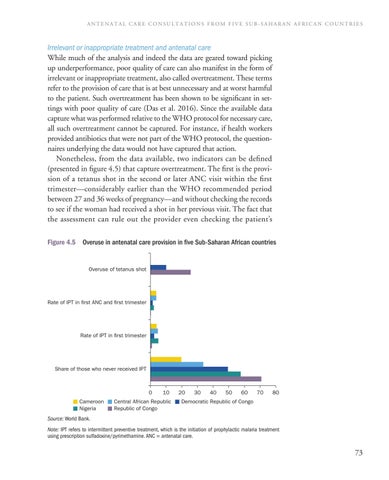A ntenatal C are C onsultations from F ive S ub - S aharan A frican C ountries
Irrelevant or inappropriate treatment and antenatal care While much of the analysis and indeed the data are geared toward picking up underperformance, poor quality of care can also manifest in the form of irrelevant or inappropriate treatment, also called overtreatment. These terms refer to the provision of care that is at best unnecessary and at worst harmful to the patient. Such overtreatment has been shown to be significant in settings with poor quality of care (Das et al. 2016). Since the available data capture what was performed relative to the WHO protocol for necessary care, all such overtreatment cannot be captured. For instance, if health workers provided antibiotics that were not part of the WHO protocol, the questionnaires underlying the data would not have captured that action. Nonetheless, from the data available, two indicators can be defined (presented in figure 4.5) that capture overtreatment. The first is the provision of a tetanus shot in the second or later ANC visit within the first trimester—considerably earlier than the WHO recommended period between 27 and 36 weeks of pregnancy—and without checking the records to see if the woman had received a shot in her previous visit. The fact that the assessment can rule out the provider even checking the patient’s Figure 4.5 Overuse in antenatal care provision in five Sub-Saharan African countries
Overuse of tetanus shot
Rate of IPT in first ANC and first trimester
Rate of IPT in first trimester
Share of those who never received IPT
0 Cameroon Nigeria
10
Central African Republic Republic of Congo
20
30
40
50
60
70
80
Democratic Republic of Congo
Source: World Bank. Note: IPT refers to intermittent preventive treatment, which is the initiation of prophylactic malaria treatment using prescription sulfadoxine/pyrimethamine. ANC = antenatal care.
73

